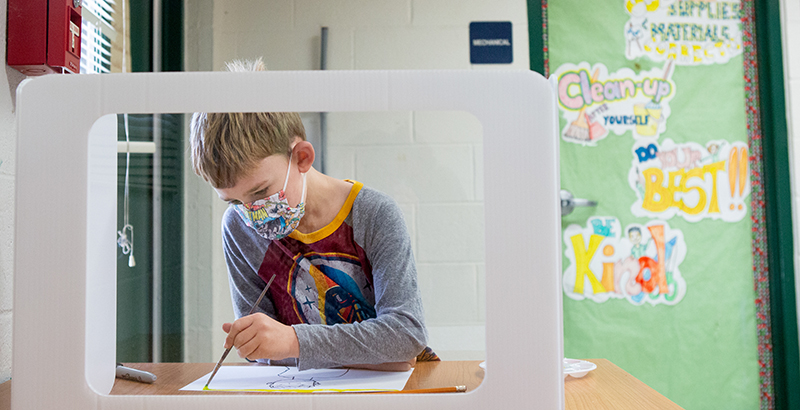Spicer: Arts Education Can Help Students’ Social and Emotional Well-Being as They Transition Back to In-Person School. Here’s How

Get stories like this delivered straight to your inbox. Sign up for The 74 Newsletter
As children make their way back into physical classrooms after an unprecedented year of virtual education, parents and educators must ask a crucial question: What can be done to help returning students cope with feelings of anxiety, depression and powerlessness?
One avenue for encouraging children’s personal wellness is a return to arts education, whose far-ranging benefits traverse their emotional, personal and academic lives.
Children engage with art in a way that is joyful and curious and encourages exploration of self. Participation in arts education fosters both coping skills and improvements to overall cognition and academic achievement. As such, in the rush to catch students up on math, reading and science learning lost to the pandemic, it’s critical that the valuable role arts education can play in easing their transition not be overlooked.
Advocacy campaigns like National Arts in Education Week, which took place during the second week of September, make the case for the arts in school with scientifically proven facts illustrating the impact of arts education on children’s social and emotional wellness as well as their academic capability. It is clear that the arts can be a valuable tool in helping kids adjust to the new normal in their scholastic lives.
Reducing anxiety, depression and stress: Major life changes, especially ones that affect a child’s home life, are among the most likely causes of stress, anxiety and depression. Participation in arts therapies, particularly those that include listening to music, can help relieve anxiety and stress, while weekly singing (as one might do in music education or chorus) is linked with reduced depression. Preschoolers who take dance classes seem less shy, aggressive and anxious, while toddlers learning music seem more sociable and cooperative. teachers report fewer instances of shy, aggressive, and anxious behavior among preschoolers taking dance classes, and toddlers receiving music instruction demonstrate increased social cooperation with other children.
Improving critical thinking: Solving problems, tackling new subjects and working out complex puzzles all use critical thinking skills, which children develop by flexing their mental muscles. Time spent observing art in a museum has been linked with the development of critical thinking skills in kids, pointing to the potential cognitive benefits of courses including art history and analysis.
Boosting math, verbal skills, literacy and overall academic achievement: A common concern of parents and educators is that the 2020-21 school year made it difficult for children to stay on pace and excel academically where they might have otherwise. Various aspects of art education can help to improve kids’ further-reaching academic outcomes, including:
- Music education, which has been associated with the acquisition of spatial temporal reasoning skills, a key aspect of mathematical learning
- General arts education; students who attended more than four years of arts education outperformed peers on the SAT
- The supportive environment of an arts ed class, is associated with motivating students to learn and helps to reduce the likelihood of dropping out of school
Increasing confidence and self-esteem: Walking back into a classroom to see peers they haven’t seen in a year and a half can be stressful for any kid, especially when they’ve grown and changed and are nervous about seeing old friends. Arts education can play a positive role here. For example, studying and training in theater is associated with improved confidence, which facilitates a boost in self-esteem.
These are but a few of the ways that arts education can benefit students. Here are 51 more:
Neve Spicer is a mother of three, writer, former primary school teacher and the founder and editor of WeTheParents.
Get stories like these delivered straight to your inbox. Sign up for The 74 Newsletter

;)